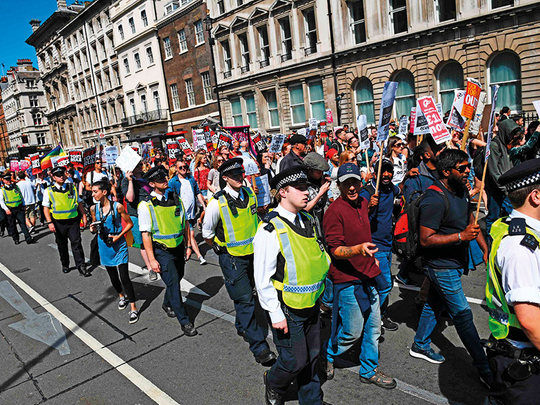
London: A record 200 women — a third of lawmakers — and over 40 openly gay, lesbian or bisexual parliamentarians won seats in Britain’s election, but charities warned on Friday of slow progress and called for political parties to be more inclusive.
The party with the most female lawmakers is the opposition Labour party with nearly half of its elected members of parliament (MPs) women, while the smaller Green Party’s only elected MP is a woman.
However, the announcement on Friday that Prime Minister Theresa May would form a new government with support from Northern Ireland’s Democratic Unionist Party (DUP), after her Conservative party fell short of a parliamentary majority, raised concerns from LGBT and women’s rights campaigners.
The DUP, one of the most socially conservative parties in Europe, has fought to maintain tight restrictions on abortion and opposes gay marriage.
The vote returned a small increase in women MPs from 191 in the last election in 2015 after which Britain ranked 46th in an index of parliaments based on the number of female lawmakers, behind many European countries and others such as Rwanda, Cuba and Belarus.
“We are moving forward at a snail’s pace and this is embarrassingly slow,” Sam Smethers, chief executive of women’s rights organisation the Fawcett Society, said in a statement.
“If the UK only improves by this much at each election, we will not see equal representation in parliament until 2062,” she said.
The election saw a record number of openly gay, lesbian or bisexual people elected, and a record number of transgender people stand for election.
Lesbian, gay, bisexual and transgender (LGBT) rights groups said there could be as many as 44 openly gay, lesbian or bisexual elected MPs.
“Representation of LGBT people in positions of power is extremely important. It demonstrates how much progress Britain has made,” Bex Stinson, head of trans inclusion for LGBT rights charity Stonewall told the Thomson Reuters Foundation.
“Having LGBT people visible in public life helps foster an inclusive society, and provides strong role models for those who don’t yet feel able to be themselves and for young LGBT people.” But several members of Northern Ireland’s DUP have come under fire after making homophobic comments.
In 2015, Northern Ireland health minister and DUP senior member Jim Wells resigned after police started an investigation into comments he made linking gay marriage to child abuse.
“You don’t bring a child up in a homosexual relationship. That child is far more likely to be abused and neglected,” Wells told a campaign event in the last election.












